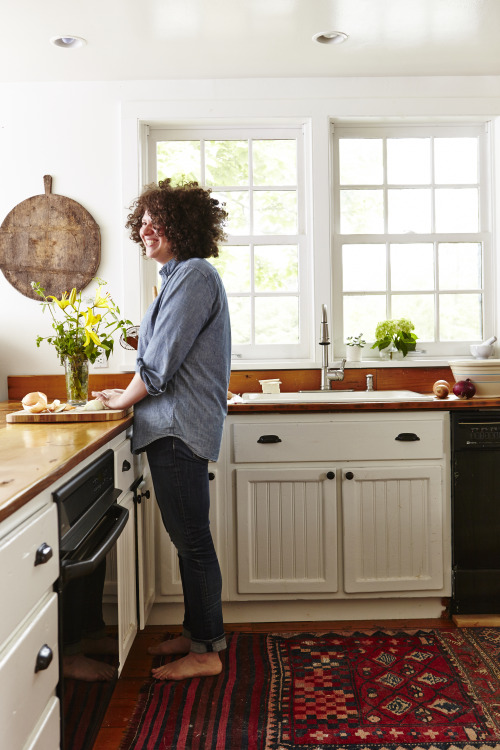“I am not at home if I am not with my cookbooks.” Julia Turshen is a cookbook author, which wasn’t something I ever really thought about before hearing about and meeting her. She also is a cookbook collector, which I am apparently not since I don’t think about the work that goes into creating cookbooks and the only one I own is the one I bought after Julia’s talk.

Julia opened her presentation about equity in cookbooks with a few pictures of herself from when she was young. One picture she showed is of her around the age of five teaching her grandparents and other family members how to make a fruit salad. The pictures she shows are undoubtedly Julia, her beaming, bright, contagious smile echoing through the pictures to the person we can see today. In the picture, she is wearing a red and white checkered apron. Today she wears comfortable-looking clothes in the form of a dark-green sweater and jeans. This does not take away from her credibility in any way. With this simple onset of a presentation at a university, I feel like I already know her personally.
Julia’s cookbook, Small Victories, is now on a bookshelf adjacent to my kitchen. I have taken it to bed with me for some light reading and downtime. It doesn’t read like what I imagine a cookbook normally would. There is a story behind each dish she provides. My favorite is Happy Wife, Happy Life Chocolate Cake. Julia talked about this particular recipe in her presentation and I had to give it a go. Unfortunately, I don’t have a wife like Julia (sigh), but I do have a roommate who I love and who I gave this chocolate cake to. I may have been hasty to try the cake and didn’t let it cool before messing with it, so it was a bit botched, but it got raving reviews. “That was great!” My roommate said as she licked the plate clean. She was impressed. So was I.

Not only does Julia write cookbooks, but she is also an activist. In discussing the importance of sitting around a table with food, she says, “The minute you put food on the table, we feel comforted and taken care of.” Julia is the founder of Equity at the Table, which has the uncanny anacronym ‘EATT.’ That may have been on purpose. Julia does say that she loves to eat, and she says that she loves to eat with people even more. As described on Julia’s website, “EATT is a practical and proactive response to the blatant gender and racial discrimination that plagues the food industry.” Julia makes it very clear that this movement is for women and gender non-conforming individuals with an emphasis on POC and the LGBTQ+ community.
Julia’s work towards food equity is vital at this time. There are many communities throughout the US that suffer from living in a food desert. Food deserts are defined by the American Nutrition Association as “parts of the country vapid of fresh fruit, vegetables, and other healthful whole foods.” When a socioeconomically disadvantaged community does not have fresh food options, they turn to fast and processed food. Although there are many groups working towards environmental and individual health, it seems that there are disparities between those and others on the social justice end of things. The next steps here may be cooperation and the building of relationships between everyone fighting in these areas of justice. Julia is obviously taking steps in the right direction.
On her journey to become a professional within the food industry, Julia hit many roadblocks and decided that the only way to make a change was to do so herself. She said, “Do what you’re doing anyway but add more meaning to it.” She took her own advice and put together a cookbook titled Feed the Resistance: Recipes and Ideas for Getting Involved. Unlike other cookbooks and unlike her own books, this work is a collection of pieces by a variety of authors and activists in the food industry. When talking about this book, Julia remarked, “The power of food is able to diffuse a situation and bring a community together.” All of the proceeds of the book go to the American Civil Liberties Union, a group that works towards protecting the rights of individuals around the country.
Julia left us with words of wisdom about how to make things like this book happen. She said to ask ourselves: What can I do right now that’s bigger than me? Once we figure that out, we can really go places. She simply told us to “do what you’re doing anyway but add more meaning to it.” Julia is so passionate about what she does. Moving forward, I hope I’m able to keep her advice close and figure out what I can do to accomplish my goals.